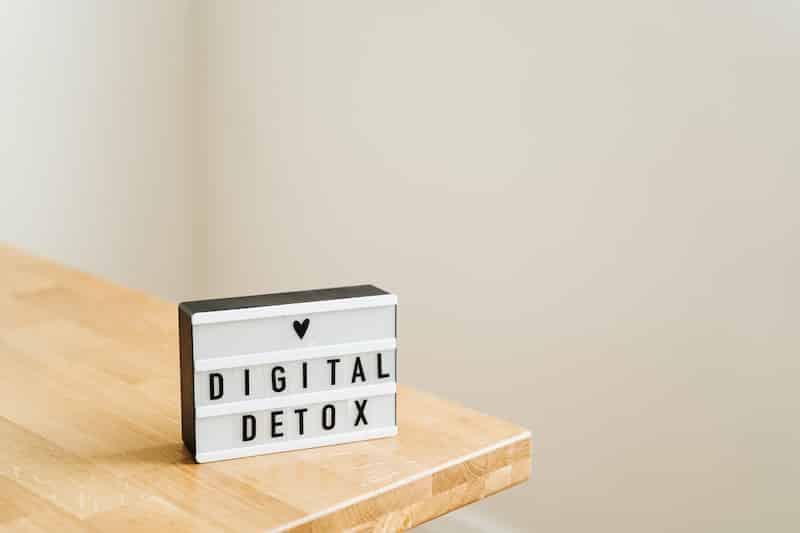
Have you ever considered a social media detox? Social media apps have become a normal fixture in our lives. In fact, 72% of Americans report using some type of social media. And the percentages are even higher when you look specifically at those of ages 18-49.
Considering that social media has become a part of most people’s daily routines, it’s no surprise that it’s made its way into other aspects of our lives.
The amount of time we spend on social media can significantly impact our mental health, our relationships, and our finances. But a social media detox can help reset your priorities and improve your finances in more ways than one.
What is a social media detox?
A social media detox is the intentional removal of social media from your life for a period of time. Essentially, it’s a period of social media minimalism. This detox can look different for everyone. Some people might choose to detox from social media for a weekend, while others do so for a more extended period.
Some may also choose to detox from social media during certain hours, such as only allowing themselves to open social media apps after a certain hour in the evening.
A social media detox has many benefits, both for your finances and other parts of your life. And the good news is that you can implement it in the way that best works for you.
How a social media detox can improve your finances
You might not think there’s a connection between social media and your finances, but there certainly is. A detox from social media can help to clear your mind and eliminate many temptations that cause you to spend money.
The urge to impulse spend is reduced
Most of us do at least some of our shopping online these days. Data shows that 76% of consumers have bought something they saw on a brand’s social media post. And many of those people didn’t go on social media with the intention of buying.
But they saw something they liked and impulsively bought it. The more time you spend on social media, the more you open yourself up to this impulsive spending.
Reduces the fear of missing out (FOMO)
It’s harder than ever to avoid FOMO — fear of missing out — when people are sharing their entire lives on social media. And when you notice all of your friends or influencers on Instagram have an amazing new product, you may feel that you’re missing out if you don’t also buy it.
Reducing your exposure to other people’s shopping habits will help prevent that feeling that you’re missing something.
Exposure to digital advertising is limited
Advertising has come a long way. These days if you even mention a certain product when you have your phone with you, you’ll notice digital ads popping up in your Instagram and Facebook feed.
And when advertisers notice you keep looking at a particular ad or clicking through to the sales page, they’ll keep showing you the ad. And the more you see it, the more likely you are to buy.
Can increase your income
Have you ever considered that the time you spend on social media may have held you back from growing your business, getting a raise or promotion, or increasing your income in some other way? When you spend less time on social media, you have more time available for other pursuits. For some people, this could mean more time increasing income.
Resets your priorities
When you spend a significant chunk of your day on social media, it’s easy to believe that surrounding yourself with beautiful things is important. And while it might be important to you, social media makes it seem even more pressing.
Stepping away can help you focus on the other priorities in your life and realize what really matters. You might be reminded of other hobbies that you love, and adjust your budget to make more room for those and less room for shopping.
Other benefits of a social media detox
It’s not just your finances that benefit from social media. Your mental health, happiness, and other areas of your life can see a huge boost as well.
Reduces comparison and envy
Social media is filled with influencers sharing beautiful homes, huge wardrobes, and the latest vacation. It seems that everyone is getting promotions, starting businesses, getting married, and having babies.
And it’s easy to feel envious of those who appear to have better lives than you. People don’t usually share their struggles on social media — it’s all the highlight reel.
But your brain forgets that when you’re scrolling. By stepping away from social media, you can gain some perspective, and maybe even spend more time noticing the awesome things in your life.
Saves time to focus on other goals
It often seems that there just isn’t enough time in the day to reach our goals. But how much time per day do you spend on social media? By eliminating social media apps, even if just temporarily, you’ll have more time in your day to focus on your personal or professional goals.
Encourages you to live in the moment
Have you ever been with a significant other or close friend and found yourself opening social media? Or maybe you found yourself scrolling Instagram more than enjoying the views while vacationing in a beautiful spot.
These habits have become the norm, unfortunately. Setting boundaries about social media use, such as not using it while spending time with others, can help you to live in the moment more. It also gives you the opportunity to spend time focusing on yourself instead of others.
Benefits your mental health
Studies have increasingly identified the connections between social media and mental health. According to a study published by the National Institute of Health, prolonged use of social media apps such as Facebook can lead to symptoms of depression, anxiety, and stress.
And over a 12-year period where social media sites came onto the market and rose in popularity, feelings of nervousness and hopelessness rose by 71%.
Social media could be impacting your mental wellness without you even realizing it. By taking a temporary detox, you give your mind and emotions some breathing room.
How to do a social media detox
Ready to start a social media detox? There’s no one-size-fits-all strategy. We’ll share a few tips to get you started, and you can choose the ones that best fit your situation, goals, and lifestyle.
Use your screen time feature to set limits
Most smartphones today have a feature that tracks your screen time. You can see how much you spend on each app, and how much you spend on your phone overall.
It’s a great way to see what your biggest time sucks are. You can also implement downtime, where your phone only allows access to texting, calling, and certain apps. This can be a great way to spend less time on your phone.
Turn off notifications
Notifications make it nearly impossible to ignore social media. Even if you tell yourself you won’t open your apps until a certain time, that can go out the window when a new notification pops up on your phone.
Redesign your home screen
Have you ever picked up your phone and suddenly found yourself on Instagram? You didn’t intend to — in fact, you barely remember doing it — but your subconscious took over. Hopping on social media throughout the day is practically second nature.
One way you can help limit this is by redesigning your home screen and putting your social media apps in a place that’s more effort to get to. By doing this every week, you’ll avoid falling into that pattern.
Unfollow influencers that make you want to spend
If you spend a lot of time on social media or follow a lot of influencers, you’ve probably noticed that there are some people who make you want to spend more. Maybe it’s that their recommendations are always spot on, or that you have the same style and love all the clothes they feature.
As much as our favorite influencer can bring a little enjoyment to your day, it might be time to unfollow. It’s just not worth it if following that person causes you to spend money.
Don’t keep your phone in the bedroom
For far too many of us, looking at our phone is the last thing we do before going to sleep and the first thing we do before waking up. A really intentional way to limit your social media intake is to detox anytime you’re in the bedroom.
Find a place in the kitchen or living room that you’ll keep the phone at night. Then you’ve gotten out of bed and had time to focus on your own goals before getting a look at anyone else’s life.
Schedule designated social media time into your day
For those who struggle with hopping on social media when they should be doing other things, consider detoxing for most of the day.
Then have a time built into your schedule when you’re allowed to be on social media. The more you stick to these boundaries, the better your self-control will become.
Delete social media apps
The easiest way to commit to a social media detox is simply by deleting the apps from your phone. This eliminates the chance of you forgetting about your new social media boundaries and subconsciously opening the apps.
If you detox from social media during certain times, you could simply re-download the apps when you’re allowing yourself to use your phone.
For example, if you plan to detox from social media on the weekends, delete the apps on Friday and download them again Monday morning.
A social media detox can change your life!
A social media detox might be just what you need to reset your priorities and your finances. By stepping away from social media for a while, you can reduce impulse spending and FOMO and have more time in your schedule to focus on your personal goals.
Not every social media detox has to look the same — you can plan yours in a way that fits your lifestyle.











